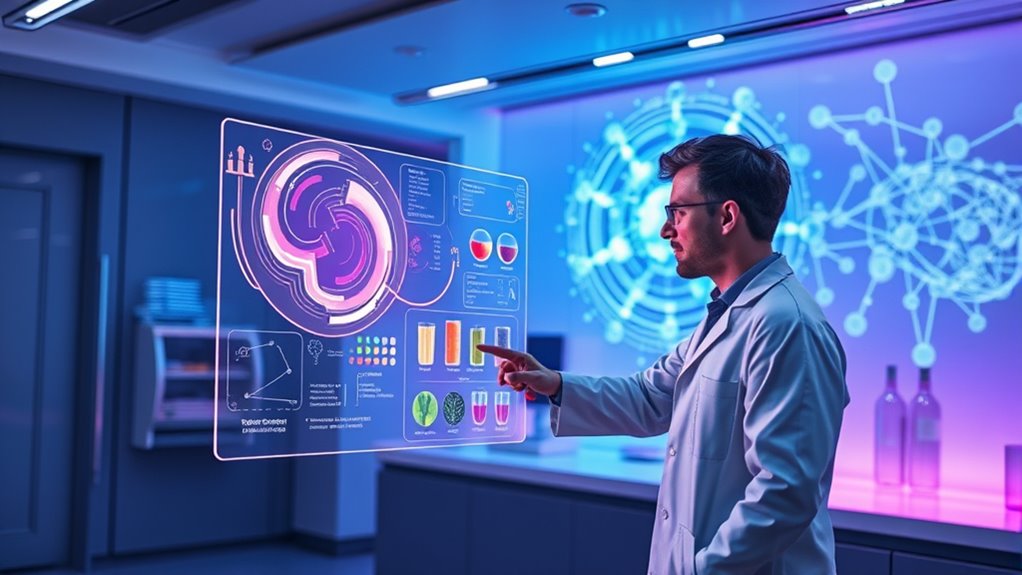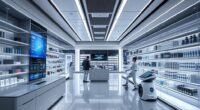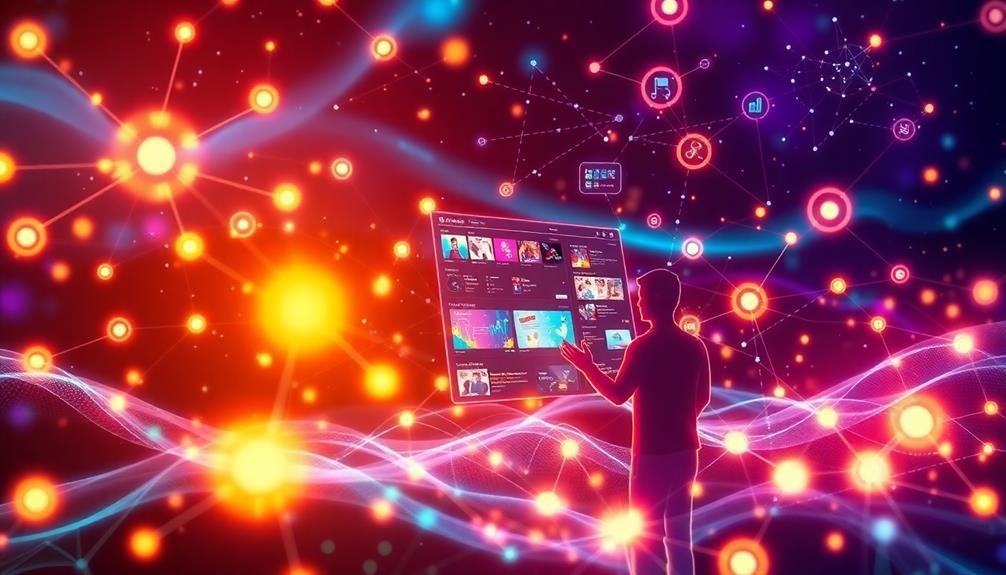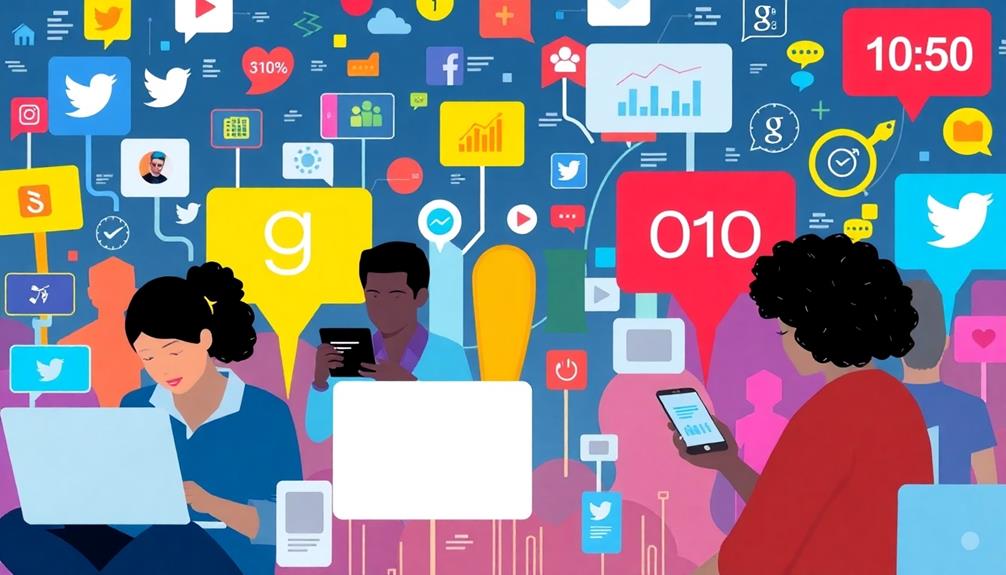AI is transforming beauty by offering personalized skincare routines tailored to your skin type, concerns, and environment. It now powers virtual try-ons, letting you experiment with shades and styles digitally, reducing returns and boosting confidence. AI also scans social media and trends in real time, helping brands craft innovative products and marketing strategies. If you’re curious how these advancements shape your beauty journey, there’s much more to uncover as AI continues to redefine what beauty means.
Key Takeaways
- AI analyzes consumer data and social trends to develop personalized skincare and beauty products that cater to individual preferences.
- Virtual try-ons powered by AI enable consumers to experiment with makeup shades and styles digitally, enhancing decision confidence.
- Advanced skin analysis tools use AI to detect issues and recommend targeted treatments, improving product effectiveness and user trust.
- AI-driven trend monitoring helps brands anticipate shifts in beauty preferences, fostering innovative product development.
- Retail experiences are transformed with AI, offering personalized consultations, smart mirrors, and seamless shopping journeys.
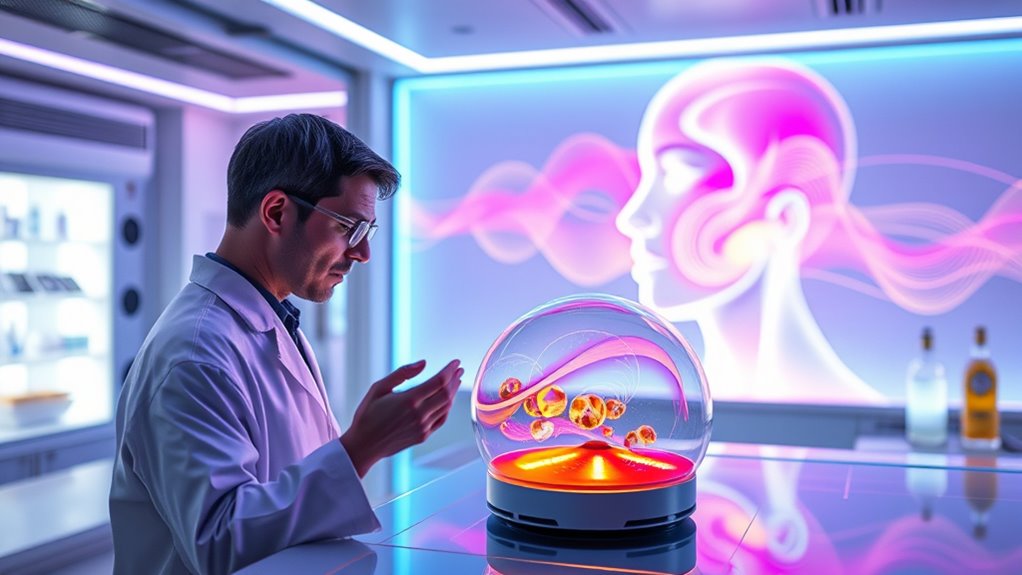
The science of taste is evolving rapidly, driven by artificial intelligence transforming how we approach beauty and skincare. AI algorithms analyze vast amounts of data on skin types, concerns, and environmental factors to craft personalized skincare recommendations tailored specifically to you. Instead of generic routines, you receive customized advice that boosts product effectiveness, enhances your skin’s health, and brings out your natural radiance. This technology supports product formulation by harnessing massive datasets on ingredients and trends, allowing brands to innovate more precisely and meet your unique needs. With AI-powered apps and diagnostic devices, you can access expert skincare advice anytime, creating treatment plans that are both accurate and convenient.
AI-driven skincare offers personalized, effective routines tailored to your unique skin needs and environmental factors.
AI’s impact extends beyond recommendations. Virtual try-ons, driven by AI and augmented reality (AR), let you digitally experiment with makeup and beauty products using facial recognition technology. This means you can see how different shades, styles, and textures look on your face without physically applying anything, reducing hesitation and encouraging exploration. Virtual try-ons accelerate your decision-making process by providing instant visualizations, making it easier to choose products that match your style and preferences. Many brands incorporate this technology into online stores and smart mirrors in retail locations, offering immersive experiences that boost engagement and reduce product returns caused by mismatched expectations. Facial recognition technology is a key component that allows these virtual try-ons to be so accurate and personalized. Additionally, integrating AI-driven personalization can further refine product recommendations based on your unique skin profile and preferences.
Advanced AI also performs detailed skin analysis, detecting issues like hydration levels, wrinkles, or pigmentation for targeted treatments. Virtual assistants guide you through product choices and skincare routines, ensuring you get personalized, scientifically sound advice. Automated recommendations minimize human error and bias, instilling confidence in your skincare choices and increasing trust in the brands you favor. Furthermore, AI keeps a finger on the pulse of emerging beauty trends by scanning social media, fashion shows, and consumer data in real time. This allows brands to anticipate shifts in preferences, develop innovative products, and craft marketing campaigns that resonate deeply with your evolving tastes.
In retail environments, AI enhances your experience through smart mirrors and interactive displays that offer virtual consultations and tailored promotions. Automated inventory management ensures products are always available, minimizing shortages and excess stock. Overall, AI is reshaping beauty by making it more personalized, engaging, and scientifically grounded, fundamentally changing how you discover, try, and trust your products.
Frequently Asked Questions
How Does AI Influence Personal Beauty Standards Globally?
AI influences your personal beauty standards globally by offering highly personalized recommendations and virtual try-ons that reflect your unique preferences. It challenges traditional norms by creating diverse and culturally relevant facial aesthetics, shifting away from fixed ideals like the golden ratio. As a result, you encounter more inclusive, dynamic beauty standards, which can empower you to embrace your individuality while also exposing you to evolving global trends shaped by data and cultural insights.
Can AI Predict Future Beauty Trends Before They Emerge?
Imagine standing on a shoreline, watching the tide before it reaches the sand—that’s what AI does for beauty trends. It analyzes vast data to predict waves before they hit, giving you a glimpse of what’s coming. With 86% of consumers open to AI-driven products, you can trust AI to forecast emerging standards, helping brands stay ahead and you to discover new styles before they become mainstream.
What Ethical Concerns Arise From Ai’s Role in Defining Beauty?
You should consider that AI’s role in defining beauty raises ethical concerns like lack of transparency, as AI models often mimic humans without clear disclosure, leading to deception. It perpetuates unrealistic standards that harm mental health and marginalize diversity. Additionally, AI-driven beauty impacts employment in fashion, fosters stereotypes, and risks social exclusion. These issues demand responsible use, clear guidelines, and increased awareness to protect individuals and promote authentic, inclusive beauty.
How Accurate Is AI in Detecting Individual Taste Preferences?
AI can detect individual taste preferences with surprising accuracy, often reaching around 77% when given a personal taste “rubric.” Yet, don’t be fooled—those last elusive 20% of nuances remain tricky. You might think technology captures your unique palate perfectly, but in reality, it’s still learning your subtle shifts. So, while AI gets close, your true taste profile still holds some mysteries only you can fully reveal.
Will AI Replace Human Judgment in Beauty and Aesthetic Decisions?
AI is unlikely to fully replace human judgment in beauty and aesthetics anytime soon. While it offers precise, data-driven insights and personalized recommendations, it can’t replicate the emotional, cultural, and subjective nuances that define personal beauty. You still value human creativity and connection, which AI can’t replace. Instead, AI will augment your choices, making beauty decisions more informed and tailored, but the human touch remains essential for true authenticity.
Conclusion
As you explore how AI is reshaping our ideas of beauty, remember that over 70% of consumers now trust AI-driven recommendations for their looks. This shows how deeply technology influences your perceptions and choices. AI isn’t just changing what’s beautiful; it’s personalizing your experience like never before. So, stay curious—this new science of taste is redefining beauty, making it more inclusive and tailored to you. The future of beauty is just getting started.

